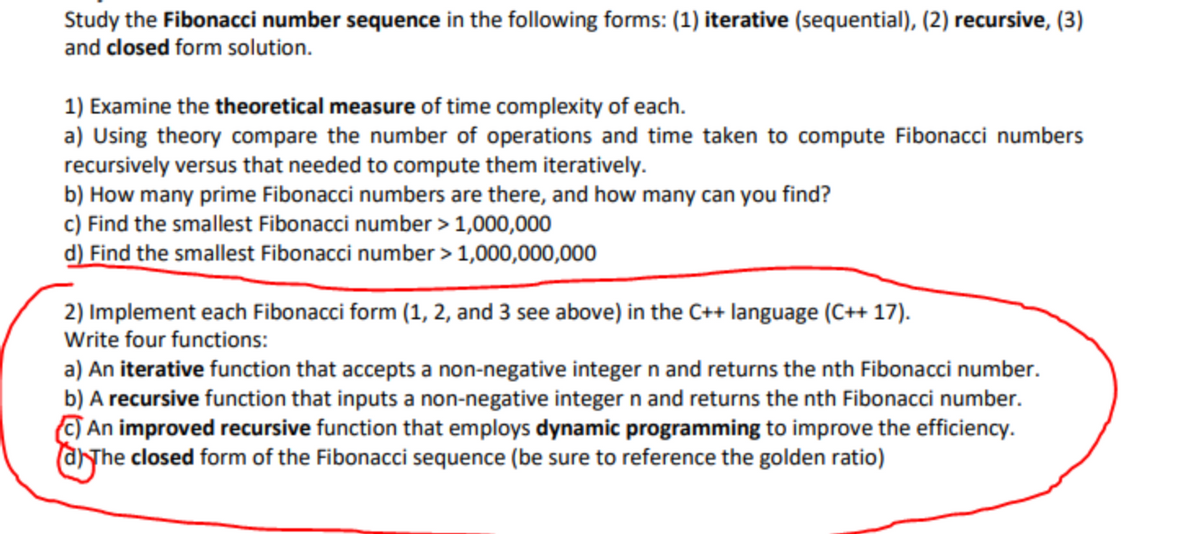2) Implement each Fibonacci form (1, 2, and 3 see above) in the C++ language (C++ 17). Write four functions: a) An iterative function that accepts a non-negative integer n and returns the nth Fibonacci number. b) A recursive function that inputs a non-negative integer n and returns the nth Fibonacci number. O An improved recursive function that employs dynamic programming to improve the efficiency. aThe closed form of the Fibonacci sequence (be sure to reference the golden ratio)
2) Implement each Fibonacci form (1, 2, and 3 see above) in the C++ language (C++ 17). Write four functions: a) An iterative function that accepts a non-negative integer n and returns the nth Fibonacci number. b) A recursive function that inputs a non-negative integer n and returns the nth Fibonacci number. O An improved recursive function that employs dynamic programming to improve the efficiency. aThe closed form of the Fibonacci sequence (be sure to reference the golden ratio)
Computer Networking: A Top-Down Approach (7th Edition)
7th Edition
ISBN:9780133594140
Author:James Kurose, Keith Ross
Publisher:James Kurose, Keith Ross
Chapter1: Computer Networks And The Internet
Section: Chapter Questions
Problem R1RQ: What is the difference between a host and an end system? List several different types of end...
Related questions
Question
C++
all I need help on is question 2 c and d. Please and I will greatly appreciate it if you can help me with this. I really really can use the help to understand this thank you so so much.

Transcribed Image Text:Study the Fibonacci number sequence in the following forms: (1) iterative (sequential), (2) recursive, (3)
and closed form solution.
1) Examine the theoretical measure of time complexity of each.
a) Using theory compare the number of operations and time taken to compute Fibonacci numbers
recursively versus that needed to compute them iteratively.
b) How many prime Fibonacci numbers are there, and how many can you find?
c) Find the smallest Fibonacci number > 1,000,000
d) Find the smallest Fibonacci number > 1,000,000,000
2) Implement each Fibonacci form (1, 2, and 3 see above) in the C++ language (C++ 17).
Write four functions:
a) An iterative function that accepts a non-negative integer n and returns the nth Fibonacci number.
b) A recursive function that inputs a non-negative integer n and returns the nth Fibonacci number.
O An improved recursive function that employs dynamic programming to improve the efficiency.
The closed form of the Fibonacci sequence (be sure to reference the golden ratio)
Expert Solution
This question has been solved!
Explore an expertly crafted, step-by-step solution for a thorough understanding of key concepts.
Step by step
Solved in 2 steps

Recommended textbooks for you

Computer Networking: A Top-Down Approach (7th Edi…
Computer Engineering
ISBN:
9780133594140
Author:
James Kurose, Keith Ross
Publisher:
PEARSON

Computer Organization and Design MIPS Edition, Fi…
Computer Engineering
ISBN:
9780124077263
Author:
David A. Patterson, John L. Hennessy
Publisher:
Elsevier Science

Network+ Guide to Networks (MindTap Course List)
Computer Engineering
ISBN:
9781337569330
Author:
Jill West, Tamara Dean, Jean Andrews
Publisher:
Cengage Learning

Computer Networking: A Top-Down Approach (7th Edi…
Computer Engineering
ISBN:
9780133594140
Author:
James Kurose, Keith Ross
Publisher:
PEARSON

Computer Organization and Design MIPS Edition, Fi…
Computer Engineering
ISBN:
9780124077263
Author:
David A. Patterson, John L. Hennessy
Publisher:
Elsevier Science

Network+ Guide to Networks (MindTap Course List)
Computer Engineering
ISBN:
9781337569330
Author:
Jill West, Tamara Dean, Jean Andrews
Publisher:
Cengage Learning

Concepts of Database Management
Computer Engineering
ISBN:
9781337093422
Author:
Joy L. Starks, Philip J. Pratt, Mary Z. Last
Publisher:
Cengage Learning

Prelude to Programming
Computer Engineering
ISBN:
9780133750423
Author:
VENIT, Stewart
Publisher:
Pearson Education

Sc Business Data Communications and Networking, T…
Computer Engineering
ISBN:
9781119368830
Author:
FITZGERALD
Publisher:
WILEY